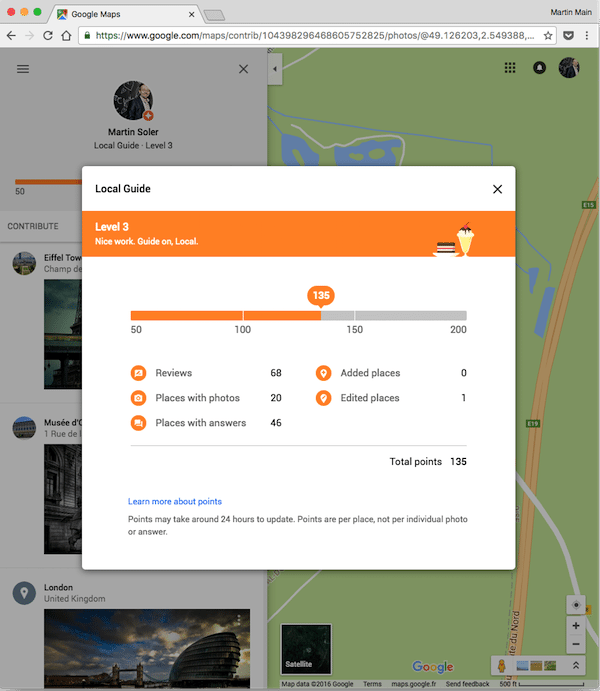Skift Take
Google has fought and annoyed TripAdvisor and Yelp for years when it comes to user reviews. The search giant obviously has the scale to compete and is now putting new emphasis on its own user reviews, but it has to prove it has the focus to upend the review balance of power.
From TripAdvisor to Airbnb, the big players in online travel want to offer it all: booking capabilities, tours and activities, and traveler reviews.
Google is no exception. But while Google has made significant moves to grow and improve its offerings in the travel sphere, it’s still finding its way in the realm of user reviews and ratings of local businesses.
Search a hotel on Google, and guest ratings from TripAdvisor, online travel agencies, Facebook and other review sources are populated in both paid and organic results. But as with its flights and hotels products, Google gives higher prominence to its own reviews, placing Google ratings just below paid results in mobile searches and at the top of the Knowledge Graph in desktop searches.
Earlier this year, Google confirmed that Google review count and score are factored into local search rankings. Google ratings are also populated throughout Maps, Trips and Destinations.
Given the ubiquity of Google reviews, their role in search rankings and their influence on consumer decisions, Google bears responsibility for ensuring the quality of its review product. But Google reviews are unsortable, inconsistent and unverified, and while the ratings of businesses are usually comparable to other review sources like TripAdvisor, Yelp and OTAs, a large proportion of Google reviews are anonymous, outdated and sparse in detail.
Google’s challenges with reviews started long ago. A few years ago, Google began scraping hotel reviews from TripAdvisor and Yelp without their consent and was hit with a lawsuit. Third-party reviews were pulled from business listings, but have since been reinstated for select businesses as “Reviews from the web.” Early this year, in an attempt to improve review volume and quality, Google began licensing reviews and review summaries for select hotels from TrustYou, which aggregates scores using reviews from across the web.
But Google, being Google, wants to own reviews. The value in reviews is unique to the search algorithm. In the early days of the internet, Google relied on backlinks as a measure of the importance of a website, among other factors. But as Google emerged as the unavoidable giant in the location business, backlinks were not enough. Reviews have become critical to the algorithm, indicating to Google the quality of the business and helping to ensure that it delivers optimal search results to users. And not only that, reviews are rich with keywords to feed the index.
Recent evolutions in Google’s applications suggest that Google is edging toward achieving its potential as a review behemoth. It is now easier than ever for users to write reviews. Thanks to GPS on mobile phones and Google Maps data, Google knows where users have been. Rather than require users to enter the business name and location, Google suggests places to review. Recently, Google started offering its Local Guides incentives to contribute reviews, including badges and Google Drive storage.

Given the popularity of Google Maps and other Google applications, Google has a tremendous amount of location-based data and user information. Open Gmail on a laptop in a hotel, and Google can prompt you to write a review — now or a few days later.
Then there’s Google Photos. And while few people may realize it, the service that allows users to upload an unlimited number of pictures has tremendous influence on what users decide to review. Travelers take pictures of the things and places that make an impression on them, whether positive or negative, and Google knows exactly where the photos are taken. So suggestions can be prioritized to the locations that matter most to the user.
Google is in a unique position to gather relevant reviews for every location people visit, a position that could cast a shadow on the market leaders of today. Couple Google’s location-aware applications and features with an easy to use review system, and Google might have the formula to become a review behemoth alongside or even above TripAdvisor and Yelp.

But Google still has a lot of work to do with its review product. This includes putting greater emphasis on policing fake reviews as well as cleaning up the quality and relevancy of reviews, which, judging by the state of some reviews, is barely on Google’s radar.
As an example, Trump Hotel in Vancouver has hundreds of Google user reviews and ratings, some dating as far back as eight months ago, yet the property won’t open until January. A scan of the reviews, many of which have nothing to do with the hotel and everything to do with the U.S. election, indicate that no one at Google is paying much attention to its review product.
If Google truly wishes to excel in the travel space, it needs to invest in building a review product that travelers trust and rely on. Until then, travel planners will continue to flock to TripAdvisor, Yelp and other sources for the depth and scope of reviews they need to be confident they are making the right trip decisions.
In the meantime, hotels can play their part in helping improve Google reviews by encouraging guests to review and post photos of their property, by monitoring and responding to Google reviews, and by reporting inappropriate reviews, photos and other content to Google.
Daniel E. Craig is the founder of Reknown, a consultancy specializing in digital marketing strategy and online reputation management for the travel industry. Martin Soler is Managing Partner of MartinSoler.com and advises hotels and hotel technology companies with strategic marketing and positioning tactics.
The Daily Newsletter
Our daily coverage of the global travel industry. Written by editors and analysts from across Skift’s brands.
Have a confidential tip for Skift? Get in touch
Tags: google, guides, reviews, tripadvisor, ugc, yelp
Photo credit: Google is now providing incentives and badges for review-writing to its Google Local Guides. Pictured are two guides at a Google event in November 2016 in Dubai, United Arab Emirates. Google Local Guides
